#literary racism
Explore tagged Tumblr posts
Text
Here's what bugs me about chapter 99 "The Dubloon":
Stubb's perspective is a really interesting device through wich to show other characters' interpretations and I can appreciate what Melville did with that to some degree. However I am still angry that we don't get to see, what Queequeg and Fedallah think about the coin, because Stubb, who is a racist asshole, is blocking the way. The goddamn old Manxman, who by comparison is so much less important of a character, get's his own little monologue, but Queequeg and Fedallah don't get to say a single word.
I feel like we were robbed of two extremely interesting perspectives here.
About Queequeg we at least get to know what he's physically doing, if not what he thinks. He seems to be comparing something about the coin to his tattoos. Stubb of course dismisses this as some kind of superstition and even supposes that Queequeg doesn't really know what a coin is (??????? wtf Stubb!?).
In actuality, what Queequeg is doing isn't even that dissimilar from Stubb's hermeneutics. Both of them try to decifer the coin's meaning by consulting some kind of document as a frame of reference. In Stubb's case that's his almanac and the Massachusetts calendar, but for Queequeg it's his tattoos.
I wish we could have known, what they mean and what Queequeg sees in that coin, but alas, this book and Stubb refuse to tell us. Queequegs thoughts remain a mystery most times just like his tattoos.
And then there's Fedallah.
I could rant for hours about how shittily the entire narrative and all the other characters treat him and this chapter is exemplary of that.
The first thing Stubb does upon seeing Fedallah come up to the dubloon is call him a "ghost-devil" and speculate on how he's supposedly hiding his devil's tail and hooves. We get to know that Fedallah "makes a sign to the sign and bows himself", but Stubb doesn't seem to know that gesture and therefore doesn't care to describe it any further, explaining it away as just some weird thing he does because he's a "fire worshipper" (as far as I know a wildly incorrect term for Zoroastrians) and the're a sun on the coin.
It's wild to me that we do not get even the slightest real glimpse into Fedallah's mind here. He is probably the one person on the ship who gets the most insight into Ahab's thoughts and feelings. He's closest to Ahab and he knows what is going on inside the captain's head and what fate the ship is heading towards. That coin on the mast that signifies Ahab's mission must mean something to him. I bet he has so many interesting thoughts about it and about Ahab, but all we get is Stubb's racist superstitions.
And really, this is what the entire book is like, clncerning this character. Fedallah does nothing objectively wrong, but the rest of the crew constantly regard him with suspicion, going so far as to claim he's the literal devil and the narrative pretty much never lets the man speak for himself about what he thinks of all this.
As you might have guessed, I'm pretty angry about this, because I think there's so many missed opportunities here and they just get thrown overboard because Stubb (the crew, Ishmael as a narrator, the entire narrative) can't be normal about non-white characters.
#moby dick#queequeg#fedallah#chapter 99 “The Dubloon”#stubb#stubb is an asshole#ishmael#herman melville#literary racism#henry rants
11 notes
·
View notes
Text
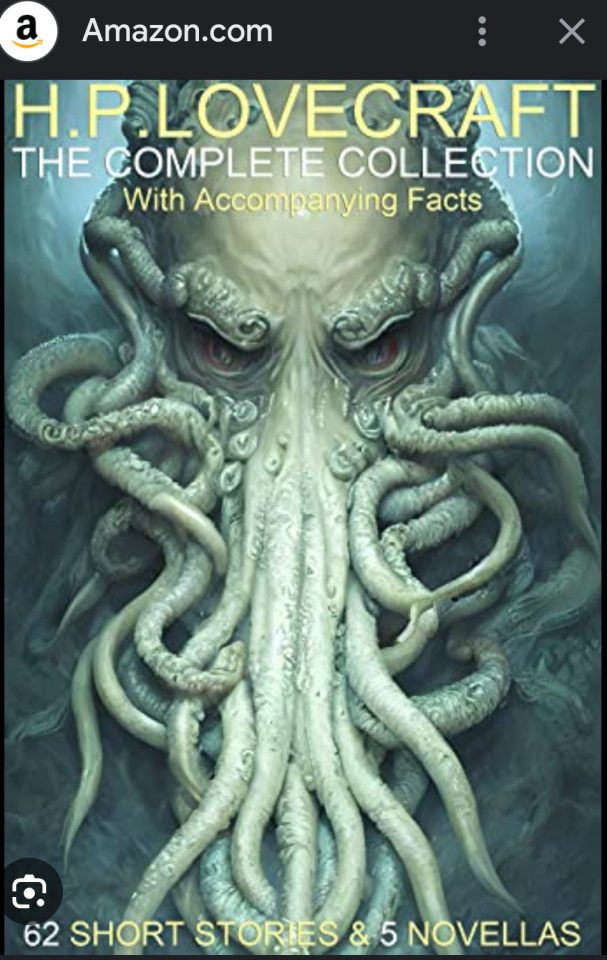
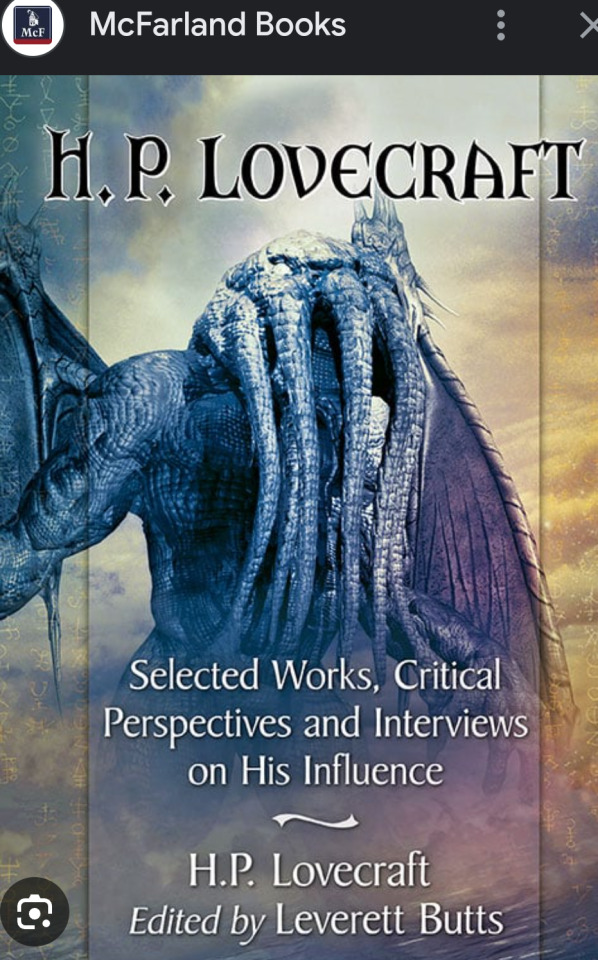
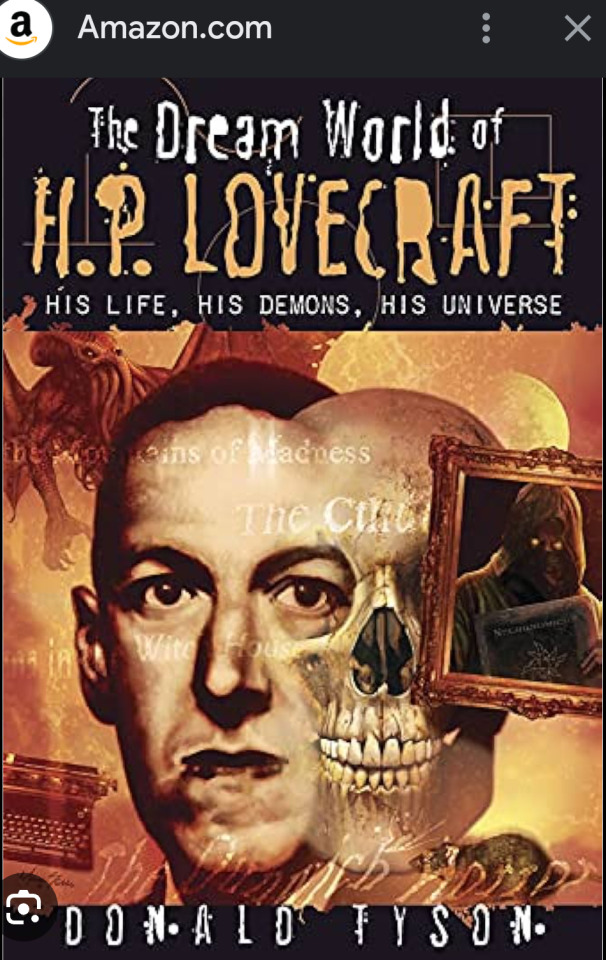
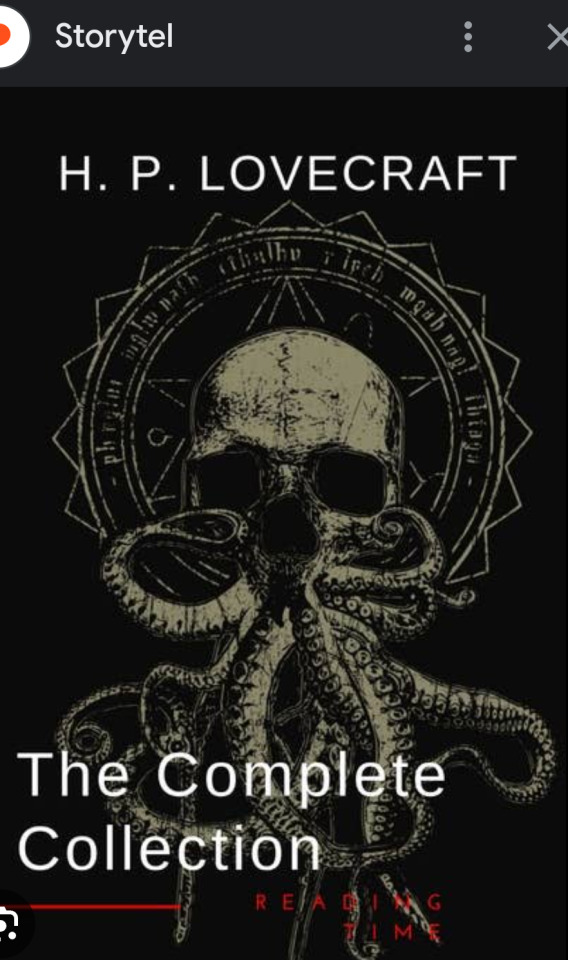
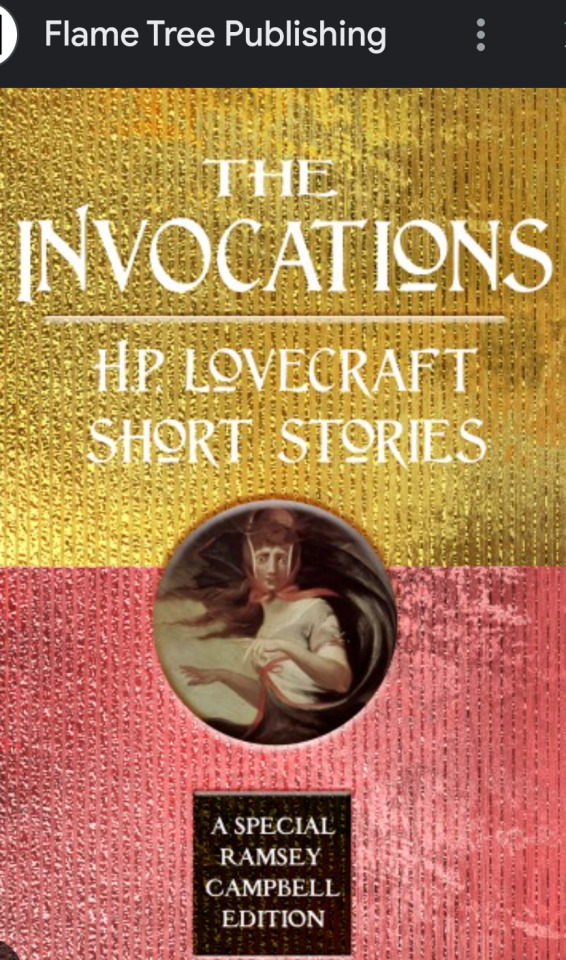
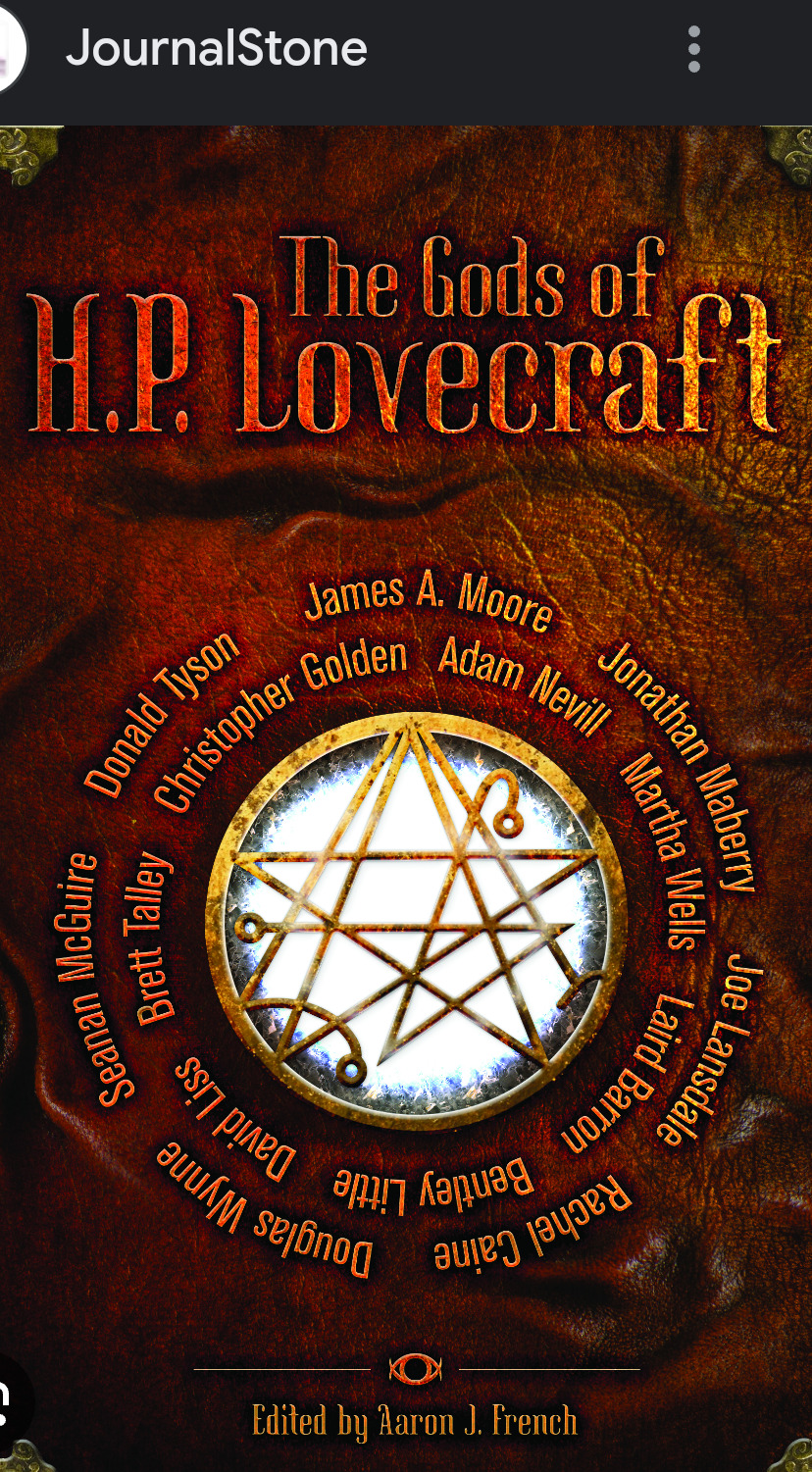
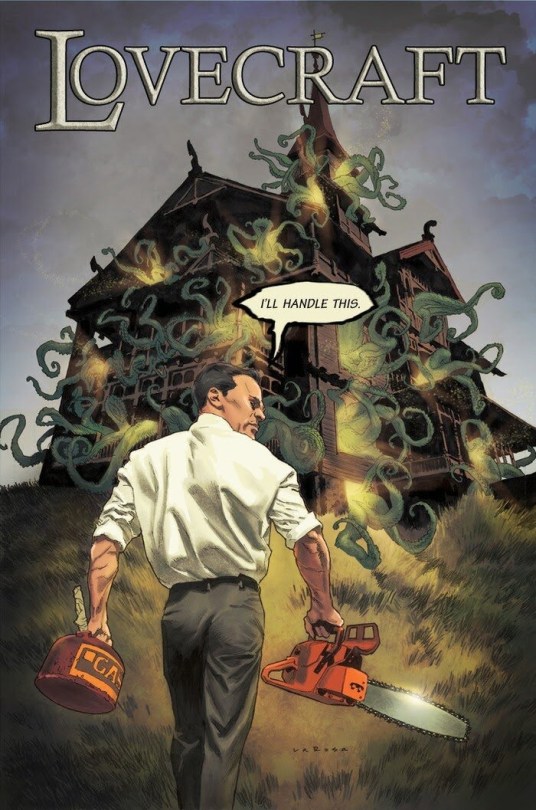
Pics: Collections & a "can do" HPL!!
It's thought that all of Lovecraft's heroes are learned wimps who go mad at the drop of some debased ichor!
This is not true.
Howard had a select few heroes who got things done.
Violently - & smartly...
I mean, ramming your ship up into Cthulhu's belly - & making it explode (!!) - has got to be up there with our modern heroes's body counts...
If events had run differently, HPL could have ended up an action writer!! Somewhere along the lines of Robert E. Howard, creator of Conan...
With his Anglo-centric fixture, could Lovecraft have rewritten Robin Hood or set down the hellish adventures of Olde Camelot!!
(Like Kirby's Demon origin story?)
Hey, we can dream - right?
1914: Commentary on "Teuton's Battle-Song."
Intro: "Battle-Song" is Howard's poem on the glories of war - as seen by the descendants of Anglo-Saxon blood.
Christianity is but an alien influence "worn lightly" by English-Americans.
Whose ancient prowess was so badly needed for the sake of the U.K. - as it was affected by WW1.
Comments: This piece of HPL's war propaganda is an expression of his persistent racist views.
Lovecraft hated that Aryan nations were fighting each other, rather than the real danger - the racially inferior enemies of civilization itself.
Howard harks back to pre-Christian paganism, evoking a philosophy of violence & bloodshed.
But, it's merely a work of fascist rhetoric. One making use of Nordic culture & white supremacist 'dreams.'
This survives today, as some modern Neo-Pagans hold explicit racist beliefs - to the dismay of the more peaceful worshippers.
These Nazi ideals also filter thruout the works of Black Metal, NeoFolk & Martial Industrial music.
For example: Boyd Rice's (of NON) anthem "Total War" has the same central point as HPL's "Battle-Song."
Both see Christ as being for wimps & that soldiers need to be merciless during war...
These same ideas were also present in Germany - since the 1800s onwards. And, reached their peaks before both World Wars.
Lovecraft, sadly, believed in the whole notion of Aryan/Nordic/Teutonic superiority.
But, with his "Battle-Song," Howard seemed to be coming up with an Anglo version of Germany's national- ism.
Though HPL claimed to strongly dis- like romanticism, he did use it for propaganda purposes.
Lovecraft himself states that he wrote "Teuton's Battle-Song" as a rebuke for U.S. pacifism.
Indeed, Howard's sabre-rattling would continue thruout WW1.
And it started long before the sinking of the Lusitania stirred up American resentment against Germany.
"Arthur" (fake-geek-boy) judges that HPL's work is - at this time - notably better than his poems.
Yet, Lovecraft wouldn't abandon his old-fashioned & heavyhanded style - until he finally switched back to writing fiction again.
Strangely enough, Howard was aware of his poetic limits.
But, thought his ability to evoke poetic imagery & emotion was so bad, that he had to maintain a strict metrical form.
HPL actually considered it more important to be formally correct - than creatively interesting - ouch!!
But, he would finally find his inner poetic muse - much later in his life.
Never give up, never surrender...
End.
0 notes
Text
It's really unfortunate that a number of people (mostly white people) in the IWTV fandom here on Tumblr seem to have this watered down view of the gothic genre as "cool, sexy monster stuff." I mean, yeah. That's *part* of it, but that's like, a very high school Hot Topic view of it. I mean, nothing wrong with liking the stuff you did in high school or Hot Topic, but it shows a lack of a deeper understanding.
I know I've ragged on Anne Rice a lot here, but I honestly think that this is partly her responsibility. Did she craft interesting characters? Yes. Did she give them flaws? Yes. But does she do a good job of challenging them? Not really. In fact, the way she frames then makes it seem like they're not flaws at all. I can accept the fact that slavery was normalized in Louis time, but I cannot accept the idea if no one in the story challenging it. It is not unreasonable for Daniel to be attracted to Louis during the interview, but at the very least, he should be uncomfortable with his attraction to him. Sometimes bad people are still attractive. That's an uncomfortable truth. But AR doesn't handle it this way. She never addresses it.
So, it's really not hard to understand why her fandom carries such limited views on uncomfortable matter, because her writing didn't challenge them to feel uncomfortable with their attraction to Louis. To Lestat. To even fucking Marius (who I won't get into here. Other people have already written about him here and have done so better than I can). AR made the sexy vampire books, and her fans just go along with all the awful things they do because, hey, they're monsters and it's cool because they live outside human expectations of morality (even though Louis was awful before becoming a monster). AR presents shock value, but doesn't address what's shocking. Her fandom, in fact, seems to take pride in illustrating no shock over what is shocking. This, in my opinion, is an illustration of *failure* to create an effective gothic story.
The show does a much better job, in my opinion, at presenting something gothic. I, a Black biracial woman of the audience, should not be attracted to Lestat. But I *am.* I shouldn't be attracted to Louis, but I *am.* I shouldn't be looking at their family dynamic with Claudia in her earlier days as a vampire through heart-shaped lenses, but I *do.* And it's uncomfortable. It's supposed to be. And I think Daniel's character does a good job of bringing the audience back into the horrible reality of the situation and causes us to check ourselves.
And I think white fandom really does a disservice to Jacob Anderson *AND* Sam Reid by trying to argue with Black fandom over the subject of race. Racism is a central theme in this version of the story. But they don't want us to talk about it, because they're uncomfortable with it. They'd rather pretend it doesn't exist and doesn't need to be discussed. But it's *supposed* to make them uncomfortable. They're just not used to seeing the benefits of being challenged, because AR never did. And unfortunately, they're missing out in a very fulfilling part of enjoying the story because they want to keep themselves in a little bubble where they can pat each other on their backs for not being shocked by shocking things and never growing as people.
#Gothic genre#Anne Rice#Iwtv#Iwtv amc#amc interview with the vampire#Jacob Anderson#Sam Reid#Fandom racism#Anti-Blackness#Loustat#Lestat#lestat de lioncourt#Interview with the Vampire#Literary Criticism#louis de pointe du lac
80 notes
·
View notes
Text
Unreliable narrator:
The protagonist spouts slavery apologism claiming all (other) slaves are actually just evil mindless murder machines that want nothing more than to slaughter all people (slave owners) they see. The protagonist is The Only Good One™ that it is safe for people (slave owners) to be around, because unlike the other slaves, it won't brutally murder them for fun. The other slaves should not be freed, because if they are, they will simply go on a violent rampage and kill innocent people (slave owners) in a savage and bloodthirsty quest for revenge, because murder is the only thing they think about. _
The "camera" then immediately switches to the perspective of (another) slave, who is wondering when they'll get to see their friend again and hoping they're still alive, since they learned a new song they want to teach them.
___
Not an unreliable narrator, literally just a racist book doing slavery apologism:
The protagonist spouts slavery apologism claiming all (other) slaves are actually just evil mindless murder machines that want nothing more than to slaughter all people (slave owners) they see. The protagonist is The Only Good One™ that it is safe for people (slave owners) to be around, because unlike the other slaves, it won't brutally murder them for fun. The other slaves should not be freed, because if they are, they will simply go on a violent rampage and kill innocent people (slave owners) in a savage and bloodthirsty quest for revenge, because murder is the only thing they think about. _
All the slaves we see try to murder the protagonist's friends (slave owners). The fact that these slaves have literally no choice in the matter is never acknowledged. These slaves are then heroically tortured and murdered by the protagonists as though the slaves were nothing but mindless murder machines instead of people. The one time the protagonist offers to free a slave, that slave responds with, "I want to kill you", thus proving that the protagonist has been right in saying that the slaves are just mindless murder machines, and it is right for not freeing slaves. The newest book of the series has a protagonist rip a slave to pieces while they're still alive, and this is portrayed as badass and cool instead of horrific beyond words.
#unreliable narrators#unreliable narrator#Slavery apologism#Martha Wells#media criticism#media analysis#SecUnit#Murderbot#The Murderbot Diaries#Rjalker reads The Murderbot Diaries#racism#slavery apologism#media discussion#media critique#literary analysis#asshole research transport#Martha Wells racism#Martha Wells slavery apologism#Martha Wells bigotry#biological essentialism#white supremacy
7 notes
·
View notes
Text
Something to be said about the similarities between Mr. Melancholy and Owen's Dad. The way Owen's Dad is always this oppressive presence throughout the movie even when we don't see him much. When we see Owen catch him watching TV and his facial features are obscured by shadows, in a way that makes him look even more like Mr. Melancholy. Owen's father is also white, seeing as I am nonblack this is not my place to speak, but I have heard from friends and other people from Mixed families that there is a specific mistreatment (namely, Racism.) of Black family members per part of white family members.
I was surprised when I found out Jane Schoenbrun isn't black, because that sounds like such a specific experience and yet it seems to be portrayed well and respectfully.
#i need to look at every corner of this movie#i wonder. did Jane consult some specific people for those aspects?#i dont think you can separate the aspect of Race from the Gestalt of TVGLOW but maybe i am looking too much into it#it's a masterpiece is all.#it's so good.#fifth rewatch#i saw the tv glow#cw racism#bad literary analysis
12 notes
·
View notes
Text
.
#well if i'm up#if you hear anyone try to claim atlantis is real ask them if they think oz is real too#it's essentially the exact same literary device used by plato in his dialogues#oz = the problems and corruption inherent to western expansion and the myth of manifest destiny#atlantis = equally fictional tale warning against the dangers of hubris in a state level society#plus modern iterations of atlantis are just racism that posits humans not from europe could never be smart enough to create civilizations#welcome to those of you who didn't know the wizard of oz was political satire i think baum should've beat the shit out of teddy roosevelt
7 notes
·
View notes
Text
A very interesting takeaway from the Farseer Trilogy so far (just started Assassin's Quest so no spoilers) that I have so far is that not only is Wit an unintentional allegory for queerness but it's also an even more unintentional allegory for autism! As an autistic person reading quite a few of the characters come across as autistic to me anyway, but focusing on Fitz specifically he has
- a very poor grasp of social cues
- a very specialised interest in both animal care and assassin things
- immediately after being revived after his month with Nighteyes he's on a similar level of functionality as an autistic person with high support needs, and in relearning to be a man he is relearning how to mask/cope
- continuing this, his constant dilemma of if he is more man or more wolf reminds me of my own personal struggle with how much of my personality is me masking vs my autism
Additionally
- Burrich's own internalised ableism (such as when he scolds Fitz for talking to Nighteyes or when he "kills" Nosy)
- whatever the fuck is going on with Kettricken
Honourable mentions go to the Fool, Patience and Verity who are also very very autistic but get differently stigmatised for it
#realm of the elderlings#rote#actually autistic#literary analysis#headcanon#I guess#fitzchivalry farseer#burrich#lady patience#kettricken#the fool rote#nighteyes#you get the idea I just sort of wanted to ramble#this was prompted by me playing ff16 and realising the racism allegory also doubles as an unintentional ableism allegory too#good book series so far
21 notes
·
View notes
Text
over the course of this semester I have developed the world's most annoyingly niche pet peeve in that most accounts of the history of vampires in english language literature now bother me because they start right at the first english vampire novel, the vampyre from 1819, skipping over all the earlier vampires in english language poetry ("the giaour" from 1813, thalaba the destroyer from 1801, arguably "christabel" from 1800).
#you guys are missing some crucial stuff in about the formulation of english literary vampires!#a lot of it is deeply unpleasant to read for racism and misogyny reasons but those are important parts of vampire mythology#marina marvels at life#vampires
52 notes
·
View notes
Text
One very interesting to note when comparing the "literary" fairytales and the "folkloric" fairytales - the fairytales actually rewritten or entirely written by authors for a literate public versus the oral folktales and "countryside" or "simple folks" fairytales collected by folklorists.
The latter tend to be very conservative, the former much more progressive than you think. Or rather... when you've got crazy nationalist and xenophobes and discriminators of all kinds, they'll turn towards the "folkloric" fairytales - but when you want to research queer, society-questioning, gender-norms-breaking, eerily modern fairytales, you'll go with the literary fairytales rather.
Don't get me wrong, do NOT get me wrong - both kind of fairytales are usually very racist in one way or another because they are from ancient times. The Pentamerone, madame d'Aulnoy's fairytales and the brothers Grimm fairytales all are very not-Black-people-friendly and always depict having dark skin as being ugly, being wicked or being a laughingstock. Because they were written by Renaissance-era Italians and French people, and by 19th century German men, so casual racism is just there.
BUT... Folkloric countrysides tend to play the cards of the casual European racism, and the common antisemitism, and the ingrained misogynistic views, much more plainly, openly and directly, because they were literaly collected among the folks that thought that, among the common population with the "common" views of the time. For example in a lot of French folkloric fairytales (not reprinted for children today) the role of the ogre or the devil or the murder in the woods will often be "the Moor" or "the Mooress", because it was okay to depict Moors are humanoid, devilish monsters used to eat the flesh of Christian children. The casual racism and antisemitism in good handfuls of the Grimm fairytales also prove the point (NOT HANSEL AND GRETEL THOUGH! I think I made my point clear). And the same way, in the Grimm you have the absolute "heterosexual-happiness" structure that was reinforced by Disney movie and is the reason why people think fairytales are inherently homophobic.
However, when it comes to literary fairytales, you have an entirely different song. Because they were LITERARY works, and as with a lot of literature pieces, you often get more progressive things than you think. Everybody knows of Andersen's fairytales queerness today that make them beautiful allegories for things such as coming out of the closet or transitioning or living in an homophobic setting, but if we take less "modern" and "invented", more traditional fairytales, we can be in for quite a surprise...
Take the Italian fairytales classics - the Pentamerone and the Facetious Nights. These works were originally satirical and humoristic adult works. Crude satire, dark humor - they were basically the South Park of their time. Slapstick gore out of an Itchy and Scratchy show, very flowery insults the kind of which you except to come of a Brandon Rogers video, poop and piss everywhere (yet another common trait with Brandon Rogers video, in fact I realized the classic Italian literary fairytales have actually a LOT in common with Brandon's videos...), and lot of sexual innuendos and jokes involving the limits of what was accepted as tolerable (extra-marital affairs, homosexuality, incest, gerontophilia, zoophilia). This was one big crude joke where everybody got something for their money and everyone, no matter the skin color, the religion, the gender or the social status, got a nasty little caricature. It does come off as a result as massively racist, antisemitic, ageist and misogynistic tales today... But it also clearly calls out the bad treatment of women, and takes all kings for fools, and completely deconstructs the "prince charming" trope before it even existed because they're all horny brutes, and it encourages good people to actually go and KILL wicked people who abuse others and commit horrid deeds... These tales inherited the "medieval comedy style" of the Middle-Ages, where it was all about showing how everybody in the world is an asshole, all "goodness" and "purity" is just foolishness and hypocrisy, how the world is just sex and feces, and how everybody ended up beaten up in the end.. (See the Reynard the Fox stories for example - which themselves spawned an entire category of "animal fairytales" listed alongside traditional "magical fairytales" in the Aarne-Thompson Catalogue.
But what about the French classical literary fairytales? Charles Perrault, and madame d'Aulnoy, and all the other "précieuses" and salon fairytale authors - mademoiselle Lhéritier, madame de Murat, the knight of Mailly, Catherine Bernard, etc etc...
The common opinion that was held by everyone, France included, for a very long tale, was that their fairytales were the "sweet and saccharine-crap and ridiculous-romance" type of fairytales. They were the basis of several Disney movies afterall, and created many of the stereotyped fairytale cliches (such as the knight in shiny armor saving a damsel in distress). People accused these authors - delicate and elegant fashionable women, upper-class people close to the royal court and part of the luxurious and vain world of Versailles, "proper" intellectuals more concerned with finding poetic metaphors and correct phrasing - they were accused of removing the truth, the power, the darkness, the heart of the "original" folkloric fairytales to dilute them into a syrupy and childish bedtime story.
But the truth is - a truth that fairytale authorities and students are rediscovering since a dozen of years now, and that is quite obvious when you actually take time to LEARN about the context of these fairytales and actually read them as literary products - that they are much more complex and progressive than you could think of. Or rather... subversive. This is a word that reoccurs very often with French fairytales studies recently: these tales are subversive. Indeed on the outside these fairytales look like everything I described above... But that's because people look at them with modern expectations, and forget that A) fairytales were generally discredited and disregarded as a "useless, pointless child-game" by the intellectuals of the time, despite it being a true craze among bookish circles and B) the authors had to deal with censorship, royal and state censorship. As a result, they had to be sly and discreet, and hide clues between the lines, and enigmas to be solved with a specific context, and references obscure to one not in the known - these tales are PACKED with internal jokes only other fairytale authors of the time could get.
These fairytales were mostly written by women. This in itself was something GRANDIOSE because remember that in the 17th century France, women writing books or novels or even short stories was seen as something indecent - women weren't even supposed to be educated or to read "serious stuff" else their brain might fry or something. Fairytales were a true outlet for women to epxress their literary sensibilities and social messages - since they were allowed to take part in this "game" and nobody bothered looking too deep into "naive stories about whimsical things like fairies and other stupid romances".
But then here's the twist... When you look at the lie of the various fairytale authors (or authoresses) oh boy! Do you get a surprise. They were bad girls, naughty girls (and naughty boys too). They were "upper-class, delicate, refined people of the salons" true. But they were not part of the high-aristocracy, they usually were just middle or low nobility or not even true nobility but grand bourgeois or administrative nobility - and they had VERY interesting lives. Some of them went to prison. Others were exiled - or went into exile to not be arrested. You had people who were persecuted for sharing vies opposing the current politico-status of France ; you had women who had to live through very hard and traumatic events (most commonly very bad child marriages, or tragic death of their kids). And a lot of them had some crazy stories to tell...
Just take madame d'Aulnoy. Often discredited as the symbol of the "unreadable, badly-aged, naive, bloated with romance, uninteresting fairytale", and erased in favor of Perrault's shorter, darker, more "folkloric" tales - and that despite madame d'Aulnoy being the mother of the French fairytale genre, the one that got the name "fairytale" to exist in the first place, and being even more popular than Perrault up until the 19th century. Imagine this so called "precious, delicate, too-refined and too-romantic middled aged woman in her salon"... And know that she was forced into a marriage with an alcoholic, abusive old man when she as just a teenager, that things got so bad she had to conspire with family members of her (and some male friends, maybe lovers, can't recall right now) to accuse her husband of a murder so he would get death sentence - but the conspiracy backfired, madame d'Aulnoy's friends got sentenced to death, and she had to exile herself it her mother in England to not get caught too. And she only returned to France and became known as a fairytale writer there after many decades of exile in other European countries the time the case got settled down. Oh, and when escaping France's justice she even had to hide under the frontsteps of a church. Yep.
Now I am reciting it all out of memory, I might get some details wrong, but the key thing is: madame d'Aulnoy was a woman with a crazy criminal life, and in fact she got such a reputaton of a "woman of debauchery" the British people reinvented her and her fairytales around the folk/fairytale figure of Mother Bunch (Madame d'Aulnoy's fairytales became "Mother Bunch" fairytales in England to match Perrault's "Mother Goose" fairytales, and Mother Bunch was previously in England a stereotype associated with the old wise woman, kind of witchy, that girls of the village went to to get love potions and aphrodisiacs or some advice on what to do once in bed with a guy - think fo Nanny Ogg from Discworld).
And many other fairytale authors of this "classical era of fairytales" had just as interesting, wild or marginal lives. The result? When you look at their tales you find... numerous situations where a character has to dress up and pass off as the opposite gender, resulting in many gender-confusing emotion and situations just as queer as Shakespeare's Twelfth Night. Several suspiciously close and intimate friendships between two girls or two men. Various dark jokes at all the vices and corruption underlying in the "good society". Discreet sexual references hinting that there's more than is told about those idyllic romances. And lots of disguised criticism of the monarchic government and the gender politics of the society of their time - kings being depicted as villains or fools, princes either being villains or behaving very wrongly towards women, many of the typical fairytale love stories ending in tragedies (yes there's a lot of those fairytales where, because a prince loved a princess, they both died), numerous courtly depictions of rape and forced and abusive marriages, and of course - supreme subversion of all subversions - people of lower class ending up at the same level as kings (Puss in Boots' moral is that all you need to be a prince is just to look the part), and other mixed-class marriages (which was the great terror of the old nobility of France, for whom it was impossible to marry below their rank - if a king married a common peasant girl, the Apocalypse would arrive and it was the End of times).
So yeah, all of that to say... All the literary fairytales I came across with had subversive or progressive elements to it ; and this is why they are generally so easier to adapt or re-adapt in more queer or democratic or feminist takes, because there's always seeds here and there, even though people do not see it obviously. Meanwhile folkloric fairytales tend to be much more conservative and reflective of past (or present) prejudices, but people tend to forget it because these stories simple format and shortness allows them to "break" into pieces more easily like Legos you rearrange.
All I'm going to say is that there's a reason wy the Nazis very easily re-used the Grimm brothers fairytales as part of their antisemitic and fascist propaganda ; and why Russian dictators like Putin also love using traditional Russian fairytales in their own propaganda, while you rarely see Italian or French political evils reuse Perrault, d'Aulnoy, Basile or Straparole fairytales.
#fairytale analysis#fairy tales#fairytales#literary fairytales#folkloric fairytales#french fairytales#madame d'aulnoy#d'aulnoy fairytales#brothers grimm#grimm#queerness in fairytales#subversion in fairytales#queer fairytales#racism in fairytales#antisemitism in fairytales#politics and fairytales
30 notes
·
View notes
Note
Do you believe racist authors deserve redemption? I love your blog and I’m interested in your opinion on this matter since you speak about racism in books.
hi anon!!! this is a great question, thanks for asking it!!!
i don't believe people deserve redemption. or that they have to 'qualify' to get better. if people want to change - its their right to change, to grow and become a better person. this is the kind of attitude i hold for authors as well.
but i think the harder part of the process comes after that. that there are consequences. some people will never forgive your racism, some people will never forgive that hurt even if you do get better, and that's....okay. its like - true change is always receptive towards criticism. it will always acknowledge the past to inform the future - and often authors (or white people in general) who want to change - just do. and they are usually understanding and introspective of the way they move in the world. bc once you see it, its very hard not to see where racism usually finds its footing. racism is learned - people are not inherently evil. but its also very baked into our foundation, so we are taught white supremacist ideologies from the moment we come out into the world.
i think the focus is oftentimes primarily put on avoiding or lessening the consequences. that an ‘I’m sorry’ will fix the wound.
racism is cruel. it has far reaching consequences - it isn't a buzzword. its fruitful to think about how racism affects its victims. how little children read literature and media and come away with the unconscious ideology that they are lesser. think abt the first racist moment in a book you read - something beloved. think about the trauma you carried when you realized the person you loved and adored and supported didn't even see you as a human being. every person of color, every black person has had that moment where they realized that a book they loved was not written for them; that they were meant to be the support, the helper, the friend, the maid, the 'perfect' girlfriend who just isn't good enough, the motivation, the body that served the vehicle for character development but never the main character. never a human being. never a fantasy.
and when you think about that - it becomes easier to see why people aren't willing to forgive how that racist author made them feel. bc we always have to carry that. we have to be the ones to unlearn hatred of ourselves. we have to carry the weight of the stereotypes, the ripples across media, the boxes we get put into.
personally - its a hard offense for me to forgive. its very hard for me to do so, because honestly my mind is always thinking about how there is there's often little motivation for some white authors to introspect bc the world is catered to them. its very hard to reflect when there's a foundation beneath you telling you there's nothing to reflect upon. so its extra work to actually make conscious change bc the world will always be content with the symbolic. people will always applaud the bare minimum. so its hard to gouge real change from just public shame. or kudos points.
in short - authors who want to change will change. authors who are empathetic and seek true change will always be vocal about it. and in those cases - i forgive. taking accountability, changing for the better and apologizing is all we can really ask. if an author doesn't do that than i have little interest in forgiving it. if an author cant say - 'oh i didn't mean that, and i recognize why that was harmful, i will do better.' then i cant take them seriously. its the bare minimum. staying silent and riding out the criticism without acknowledging what was harmful and how it was harmful means you seek none of the true change and it means im not interesting in supporting or forgiving, but alas that's just me!
#literary critique#literary criticism#racism in literature#racism#representation matters#queue092623
35 notes
·
View notes
Text
one of the absolute worst unironic takes i've seen on the instawebs is "only people from x background can write main characters from x background" like holy shit how can you possibly politicize literature to this extent?
it's genuinely shocking to me that some people's personal motto when it comes to art and media creation is "only write what you are". with this mindset, writing inherently becomes about social and political identity when it should be about "let's do justice to this character and their background the best we can".
#being from the caribbean which is so defined by métissage is one of the myriad reasons why this is so insane to me#like research write and get feedback when you write things that you aren’t#if your work still sucks after all of that then yeah people should call you out#but the idea that only x can write x is ludicrous and also pathetic#publishing is such a dumpster fire post-tiktok#for anyone new here i’m both muslim and indo-caribbean this isn’t some kinda lowkey internalized racism post btw#books#literature#reader#book blog#media literacy#reading comprehension#books and literature#identity politics#literary criticism#critical reading#woc writers#writing#poc dark academia
53 notes
·
View notes
Text
Why incorrectly using a supremacist label for humor/characterization is problematic
The incorrect usage of Ku Klux Klan to hate on Caitlyn Kiramman could be considered a small problem considering that she is ONLY a character. The phrased used as mockery is also ironic because there is ZERO racism presented in the show and the KKK is a white supremacist terrorist group bent on hate crimes toward black Americans, Jews, and Catholics.
Nevertheless, referencing the KKK says more about the person who uses the phrase.
They are ignorant of the dark history of the KKK, segregation, brutality (i.e murdering, torturing, lynching) used specifically against black Americans. As a person who enjoys a bit of dark humor and satire, I think it's okay to use as a humorous reference in the correct pretense. But the incorrect usage, reduces the KKK to evil boogie men in white sheets, myths, long ago horrors, fictionalized villains like Darth Vader, Joker, the Terminator. When the KKK is very much alive in the US South as a small angry faction and/or funneling into other hate groups.
If you know this already, I will be side eying you because what do you mean...either you are a troll or something else. Opinions, barbs are not always harmless. During WII, America decided to throw successful Japanese Americans into concentration camps because Japan was the enemy and therefore it meant Japanese Americans were the enemy too? A nonsensical idea steeped in racism and fear.
Continue to use the phrase if you must, but it reveals a lot about you.
#caitlyn kiramman#caitlyn arcane#racism not in arcane#Mislabeling characters#learn how to use humor and the correct literary terms#history class
6 notes
·
View notes
Text
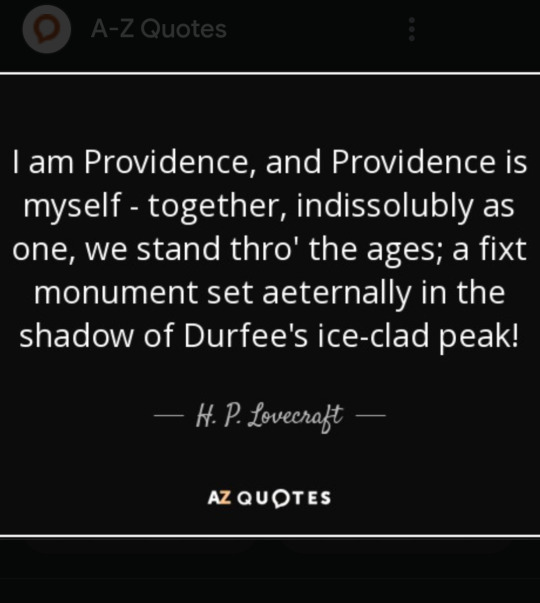
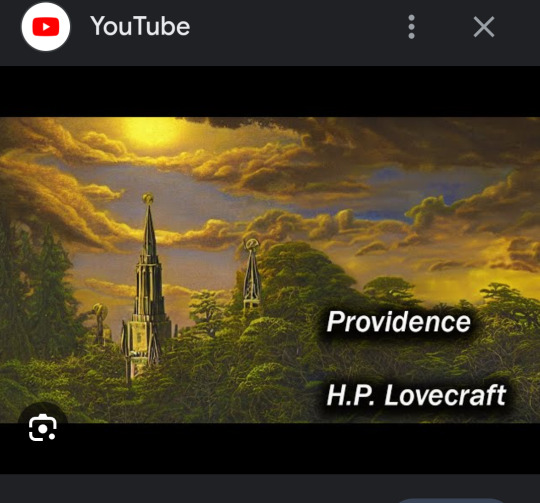
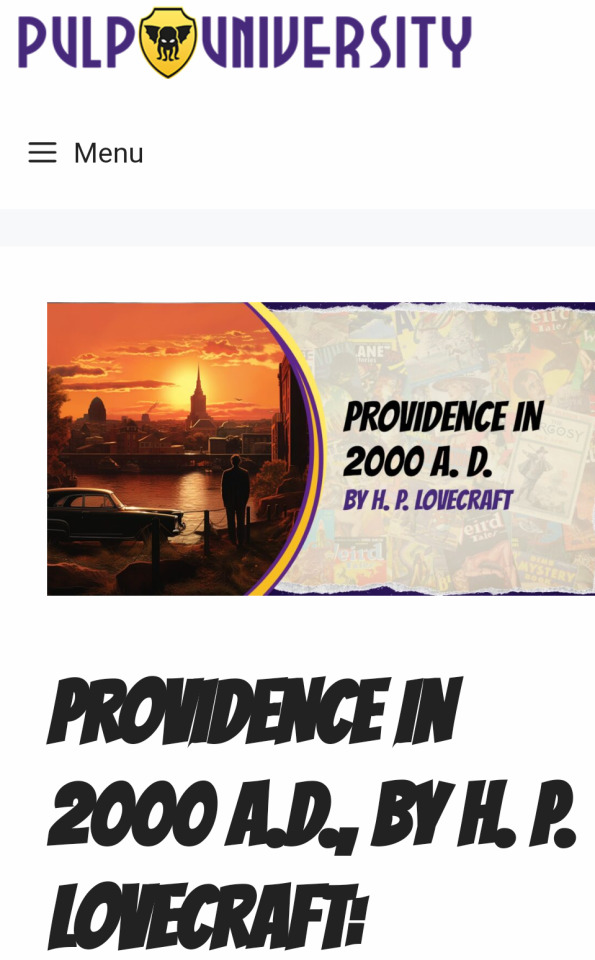
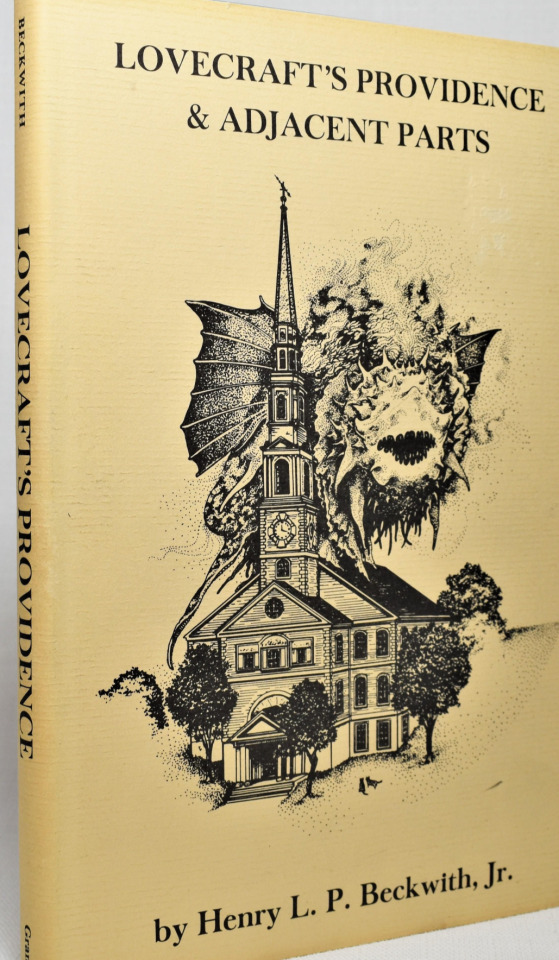
Pics:
1. Lovecraft's identification with the city of Providence was the result of his nightly explorations & his relief at going home - after his 'horrifying' life in NYC.
2. This is Howard's view of 'heaven' on Earth! He grew up here & knew this city intimately.
Even after all of the pains that HPL suffered here, Providence was his choice of sanctuary.
3. The early racist poem that we'll be examining today...
4. THE 1st guide to the Lovecraftian side of Howard's favorite city - on Earth.
1912: HPL Output.
Intro: Since HPL's 1st racist letter was published in a local newspaper, I'd guess that Lovecraft decided to try his hand at writing more of the same.
This year saw a real explosion of written pieces from Howard. Some of it racist, most of it 'experimental.'
Output: "Providence in 2000 AD" was published in the local Providence Evening Journal.
It's supposed to be a satire directed towards Italian-Americans & 'other' races that HPL feared.
This work imagines the displacement of white folk by immigrants.
It's amazing the suspension of common sense that 1 has to go thru, to not see the blind stupidity of such statements.
I mean, everyone born in America are the children of immigrants - including white people.
What matters most is how we treat each other...
But, the integration of races was a major horror for Lovecraft.
Anything, he wrote, would be better than "the mongrelization & eventual deterioration of (the White) nation."
And, nothing - but "pain & disaster - will come from mingling... Blacks (with) Whites."
Plot: The usual, nameless narrator visits Providence, R.I. - where immigrants displaced his ancestors.
The city has changed so much, it's impossible to understand the new language!
And, "the city (echoes) with foreign cries."
Streets & landmarks have also had their names 'overthrown.'
Mechanical devices are "shaky" & rails have become "rusty."
The Post Office & schools are "ruins waiting to be sold."
People are "loud" & "factories (have) increased the din."
The racism comes in "where(ever) clustered swarthy men of every hue & shape."
Jews are targeted by the age-old racial taunt "the wealth that Israel (illegally) amassed."
And, French "Gauls from Canada poured in..."
"In terror" (though never threatened in any way!) our brave hero retreats back to the wharf.
Like in "Shadow Over Innsmouth", the narrator meets a white survivor, "a half crouched, shriveled form" identifying himself as "the last American!"
Future Tech: In this narrative poem, giant ships cross the Atlantic Ocean - in a day!!
Inspiration: All of this anxiety was due to the Providence Evening Journal's announcement of Italians wanting to change Atwell Avenue to Columbus Avenue...
Criticism: This work shows much fear about cultural changes - which never truly manifested in reality.
For those who care for such things, Providence is still white as bread today - in January, 2024!
The city's not crumbling into ruins.
Nor have Jews taken over its trade. They have more important problems in their own country...
So... Big oops!! You were (or still are) worried over nothing.
Though we are going thru a period of foreign influence & out of control immigration - it's due to Putin's spies & our own gas guzzlers...
Climate change & drug cartels are now forcing people to uproot their lives.
These folk now find themselves trying to seek safety (& work) in the most successful nation on Earth.
But, the move to robotic systems here, is starting to choke off many avenues to employment - menial or otherwise...
These are events which are only growing our homeless population.
But, if we're only looking for someone to blame - look in the mirror.
It's all of our choices that have led to today's many problems. As it has in the past as well.
We can, in the future, try to choose a bit more wisely...
But, don't expect any to make any major changes. We've shaped the world to fit our own wishes - no matter who disapproves.
And, people don't really change - only our tech does...
1 note
·
View note
Text

Remembering the Past, Shaping the Future: The Literature of Toni Morrison
Toni Morrison's life and work are a testament to the transformative power of literature to challenge societal norms and give voice to the marginalized. Growing up in a segregated America, Morrison's childhood experiences had a profound impact on her writing, as her family's stories and the harsh realities of racism and violence instilled in her a deep understanding of the world around her. The story of a childhood friend who yearned for blue eyes, which inspired her to write "The Bluest Eye", is a poignant example of the lasting impact of these early experiences. This novel, her first, was initially met with negative reactions from the black community due to its depiction of sensitive topics such as incest, but it ultimately became a classic of American literature, cementing Morrison's reputation as a fearless and unflinching writer.
Morrison's writing style is characterized by its lyricism, complexity, and innovative use of narrative techniques, blending elements of poetry, history, and mythology to create a unique and powerful literary voice. Her works often explore themes of identity, community, and the search for freedom and self-expression, as seen in novels such as "Beloved", which delves into the legacy of slavery and its impact on individuals and communities, and "Song of Solomon", which examines the struggles of black Americans to find their place in a society marked by racism and oppression. Through her writing, Morrison seeks to honor the ancestors and preserve the history and culture of black people, giving voice to the silenced and marginalized, and challenging readers to confront the darker aspects of American history and society.
Morrison's personal life and experiences have also had a significant impact on her writing, as her father's anger towards white people and her own experiences with racism and segregation influenced her work, and her time at Howard University exposed her to a wide range of experiences and stories from other students. As a single mother, Morrison faced significant challenges in balancing her writing career with her personal life, but she continued to write about the experiences of black people and advocate for social justice and equality, using her platform to amplify the voices of those who had been silenced or marginalized. Throughout her career, Morrison has been recognized with numerous awards, including the Pulitzer Prize and the Nobel Prize in Literature, a testament to her enduring impact on American literature and culture.
Morrison's legacy extends far beyond her own writing, as her work has influenced generations of writers and readers, and continues to be widely read and studied today. Her writing has been praised for its beauty, complexity, and emotional power, and has helped to give voice to the experiences of black people and other marginalized communities, challenging readers to confront the complexities of American history and society. As a literary icon and champion of social justice, Morrison's impact will be felt for generations to come, inspiring future writers and readers to confront the challenges of their time, and to use their voices to advocate for justice, equality, and human dignity. Morrison's life and work serve as a powerful reminder of the transformative power of literature to challenge, to inspire, and to uplift, and of the enduring importance of empathy, understanding, and social justice in our shared human experience.
Toni Morrison Remembers (Jill Nicholls, BBC Imagine, 2015)
youtube
Monday, December 30, 2024
#american literature#social justice#racism#segregation#feminism#literary analysis#nobel prize#pulitzer prize#african american literature#women writers#documentary#ai assisted writing#machine art#Youtube
6 notes
·
View notes
Text
A smaller one so it's easier to read.
Is there a name for bingo cards with less than 5 rows lol? Bin??

[ID: A 3 by 3 Bingo card labeled, "Media analysis and Criticism Bingo". The boxes read, from left to right and top to bottom:
Ableist insults
"Clearly you haven't actually read the book you're analyzing",
Ignoring the problem you're actually talking about to argue against some other unrelated thing that you literally did not say (aka strawmanning)
"Well, in my headcanon, that problem doesn't exist, so you can't criticize the actual story for it either.".
Unreliable narrator ( this is followed an absurd ammount of exclamation marks),
"All interpretations are valud UwU including the bigoted ones and the ones that have literally no basic in fact".
Just completely and utterly lies about extremely basic facts about the books and then acts like this means they win the conversation.
"Yes, I am going to ignore the 50 quotes you pulled diretly from the book with page numbers listed. You're wrong. No I will not prove how or why.",
"Actually, the author said on twitter—"
End ID.]
#described images#bingo#bingo card#bin...card?#media analysis#media criticism#fandom bullshit#fandom bigotry#anti-intellectualism#fandom racism#literary analysis#literary criticism
9 notes
·
View notes
Text
God I saw the stupidest fucking post somewhere but I can’t quite recall which hellsite platform
Basically the post was talking about this 100% totally real Human Person who only watched anime and somehow never ever touched any media that wasn’t anime and he…. Ran out of anime to watch? (LITERALLY IMPOSSIBLE there’s too much) so he decided to *gasp* read Literary Books TM and had an epiphany that anime was the worst way to tell a story and that was basically the end of the post
Idk why this post lives in my head rent free. Maybe it was the positive responses to this, again, 100% Real Human Person Who Totally Exists. Or maybe it’s because I just kept thinking; what sort of weird anime was this Totally Real Person watching? Isekai Hentai? Like obviously that’s not going to have the same purpose as fucking. The Catcher in the Rye or Dracula.
So fucking stupid. And so is everyone who interacted positively to that post. I weep.
#shutuplanx#I’m. so fucking annoyed don’t even ask me why#maybe it’s the racism? maybe it’s the fact that all anime is#is a MEDIUM. its like saying you can’t tell a good story using film#it’s Japanese cartoons. calm down#I swear I will kill you#the fields of literary analysis and criticism is dead
3 notes
·
View notes